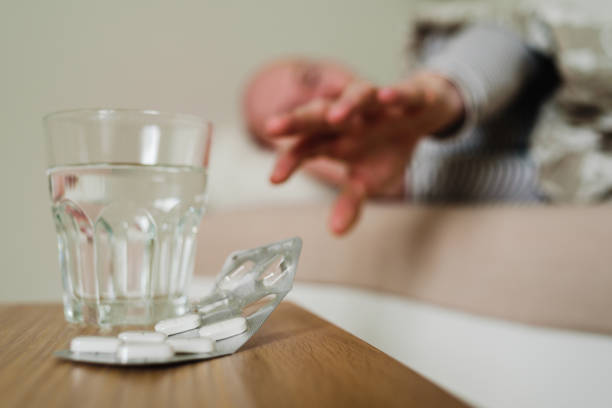Introduction:

Living with Parkinson's disease presents a unique set of challenges that extend beyond the confines of medical diagnosis. As a neurodegenerative disorder affecting the central nervous system, Parkinson's disease gradually impairs motor functions, leading to tremors, stiffness, and difficulties in movement. However, its impact is not limited to physical symptoms alone.
This blog post delves into the intricate ways Parkinson's disease influences daily life, examining the evident motor struggles and the less-discussed emotional, social, and cognitive dimensions. By understanding the multifaceted nature of this condition, we can gain insights into the profound adjustments that individuals with Parkinson's, as well as their families and caregivers, make to maintain a sense of normalcy and quality of life in the face of adversity.
What is Parkinson's Disease?
Parkinson's is a neurological disorder affecting an estimated 10 million people worldwide. It arises due to the gradual degeneration of cells in the brain region responsible for regulating movement, resulting in motor impairments like tremors, muscle stiffness, and challenges with initiating or maintaining movements. Symptoms may vary from individual to individual and can range from mild to severe.
It is crucial to acknowledge that Parkinson's disease not only impacts motor functions but also profoundly influences various facets of everyday life. In the sections below, we will explore the various components of the disease and how it affects our everyday lives.
How can it affect a person's life daily?

Living with Parkinson's disease involves managing both physical and mental health daily. Physical symptoms such as tremors, balance issues, and slow movements can make tasks like dressing, writing, or walking difficult. Those affected by the disorder may also experience fatigue or depression due to their condition.
The cognitive effects of the condition can be equally disruptive, leading to impaired decision-making, difficulty concentrating, and memory loss. This can make it difficult for individuals with Parkinson's disease to stay organized and on task.
Additionally, communication may be hampered due to the slurred speech often experienced by those with the disorder. Given these difficulties, many individuals must make significant adjustments to their daily lives to maintain a sense of normalcy.
This may include finding ways to manage fatigue and exhaustion, reducing their daily activities, or seeking out alternative methods of communication. It is important to remember that Parkinson's disease can be physically and emotionally draining, so those living with it must take time for self-care to continue functioning at their best.
Overview of Treatments for Parkinson's Disease
Living with Parkinson's disease can be greatly improved through the use of both medications and lifestyle changes. This section will discuss some of the treatments available to those suffering from this condition.
Medications

Medications are important in managing Parkinson's disease symptoms as they can help reduce tremors and control muscle stiffness. Dopamine agonists, the most frequently prescribed medications, replicate the effects of dopamine on the brain.
These drugs effectively mimic the actions of dopamine, providing relief and addressing various conditions. Other common drugs used to treat Parkinson's include levodopa, anticholinergics, MAO-B inhibitors, and monoamine oxidase type B (MAO-B) inhibitors.
Deep Brain Stimulation
Deep brain stimulation (DBS) is a minimally invasive surgical procedure in which an electrical current is sent to certain brain areas, improving motor symptoms. Deep Brain Stimulation (DBS) offers a secure and efficient therapeutic approach for Parkinson's disease, enhancing the overall quality of life.
Exercise

Exercise is beneficial in managing Parkinson's disease. Regular physical activity can reduce tremors, improve balance, and help with coordination. Engaging in gentle aerobic activities like cycling, swimming, or walking can provide excellent options for individuals with the disorder.
Diet
Maintaining a balanced diet is crucial for individuals with Parkinson's disease to uphold a healthy weight and promote overall well-being. Including a diverse range of fruits, vegetables, whole grains, and lean protein in one's meals can alleviate fatigue and boost cognitive function.
When selecting supplements or nutritional products, it's crucial to exercise caution to avoid potential drug interactions that may interfere with medications for Parkinson's disease.
Occupational Therapy
Occupational therapy can help those living with Parkinson's disease manage activities of daily living such as dressing, bathing, and eating. This type of therapy also focuses on improving coordination and balance to reduce the risk of falls.
Emotional Support
Living with a chronic condition can present emotional and mental challenges. Therefore, it is crucial for individuals affected by Parkinson's to actively pursue counseling or seek support groups. These resources provide a sanctuary for individuals to share their experiences and connect with others who truly understand their path. It offers a space where they can find solace, support, and a sense of belonging.
By integrating medications, making lifestyle changes, receiving occupational therapy, and receiving emotional support, individuals with Parkinson's disease can discover effective strategies to manage their condition and enhance their overall quality of life. Finding a personalized treatment plan customized to your needs is paramount to maximizing functional abilities.
It is crucial to optimize your potential by tailoring the treatment to your unique requirements. Finding a treatment plan that works for you and your specific needs is important to help maximize functioning. By doing so, those with Parkinson's can make the most of everyday life and live more independently.
Symptoms and Diagnosis of Parkinson's Disease
Overview of Symptoms

-
The symptoms of Parkinson's disease can vary widely depending on the severity and progression of the disorder. In general, three primary motor impairments are common for those with the condition: tremors, rigidity, and bradykinesia.
-
Tremor is often one of the first symptoms that typically begins in one hand or arm. It may manifest as a rhythmic trembling, which is more pronounced when the limb rests.
-
Muscle rigidity is characterized by the stiffness of muscles, which can impede the full range of motion and lead to discomfort. Rigidity is often accompanied by increased resistance when attempting to move one's limbs, making it difficult to coordinate movements.
-
Bradykinesia, or slowness of movement, is generally characterized by difficulty initiating movements. This can pose challenges in performing basic activities like walking and writing.
-
Other common symptoms include balance problems, impaired posture and gait, speech changes, and facial masking. Cognitive difficulties such as memory loss and impaired decision-making are also common in those with Parkinson's disease.
Diagnosis

-
Parkinson's disease can be difficult to diagnose due to its varied symptoms. It is often mistaken for other conditions, such as essential tremor or multiple system atrophy. Typically, a diagnosis of Parkinson's is made when two or more core motor symptoms (tremor, rigidity, and bradykinesia) are present.
-
To diagnose Parkinson's disease, a healthcare provider will carefully review the patient's medical history and conduct a thorough physical examination. They may also order blood tests, brain scans, or a DaT scan (a specialized imaging test that looks for dopamine transporter proteins in the brain).
-
It is important to note that a diagnosis of Parkinson's is not definitive, as there are no specific tests to confirm the disorder. Instead, the diagnosis is made based on clinical presentation and associated symptoms.
What challenges does a person with Parkinson's face daily?
Fatigue
One of the most common and debilitating challenges faced by those living with Parkinson's disease is fatigue. Physical exertion, medication side effects, or the condition can cause fatigue. This fatigue can interfere with activities of daily living, such as walking, dressing, and eating. Additionally, fatigue can interfere with cognitive functioning, making concentrating or remembering things difficult.
Cognitive Difficulties
Parkinson's disease can also cause cognitive difficulties, such as slow thinking and impaired decision-making. Other symptoms of Parkinson's related to cognition include problems with memory, difficulty understanding complex information, and difficulty finding the right words when speaking. Individuals with Parkinson's often face challenges in performing daily tasks that demand mental effort and concentration due to cognitive impairments.
Pain
The stiffness associated with Parkinson's disease can also lead to chronic muscle and joint pain. This pain can be caused by cramping, spasms, or rigidity of the muscles. Additionally, pain can be caused by poor posture and balance issues, which can lead to musculoskeletal problems such as back pain or foot pain.
Movement Issues
One of the most significant challenges faced by those living with Parkinson's is movement-related difficulties such as tremors, bradykinesia (slowness of movement), and rigidity. These issues can make walking, getting dressed, or writing difficult.
Dysphagia
Another common symptom of Parkinson's disease is dysphagia or difficulty swallowing. This can make it challenging for those with Parkinson's to eat solid foods and can increase the risk of choking. Swallowing difficulties can also lead to dehydration and malnutrition, further complicating the condition.
Sleep Issues
Parkinson's disease can also cause significant sleep disturbances such as daytime drowsiness, insomnia, difficulty staying asleep throughout the night, difficulty with turning through the night and getting in and out of bed, and disturbed breathing. These issues can make it difficult for those with Parkinson's to get enough restorative sleep to manage the condition.
Overall, Parkinson's disease can present various challenges daily, ranging from physical impairments such as tremors and stiffness to cognitive and emotional issues. Effective communication of needs and close collaboration with healthcare providers are vital for individuals with the condition.
This partnership facilitates the development of a personalized treatment plan tailored to their unique requirements. This plan might include medication, physical and occupational therapy, mobility adis, and lifestyle changes such as stress-reduction techniques. By addressing the various challenges posed by Parkinson's disease, those living with it can continue to lead an active and fulfilling life.
Does Parkinson's affect life?
Yes, Parkinson's disease can have a profound effect on everyday life. Physical impairments, such as tremors, rigidity, and bradykinesia, can pose challenges when carrying out routine tasks like walking, dressing, or writing. These difficulties can significantly impact one's ability to engage in daily activities.
Additionally, cognitive difficulties such as memory loss and impaired decision-making can put additional strain on those living with the condition. Other challenges related to Parkinson's disease include fatigue, pain, dysphagia (difficulty swallowing), and sleep disturbances.
These issues can present a significant challenge for those living with the condition, but proper care and treatment can manage these symptoms and lead an active life. This might include medications such as dopamine agonists or MAO-B inhibitors, physical and occupational therapy, lifestyle changes such as stress-reduction techniques, and supportive care for emotional well-being. By developing an individualized treatment plan with a healthcare provider, those living with Parkinson's can continue to lead active and fulfilling lives.
Activities of Daily Living with Parkinson's Disease
Here are some of the challenges to activities of daily living faced by those with Parkinson's:
-
Difficulty dressing - due to tremors or stiffness, buttons may be difficult to manipulate, and clothes might be slow to put on.
-
Difficulty walking - due to balance issues, gait abnormalities, and slow movement.
-
Difficulty eating - due to dysphagia or difficulty swallowing, those with Parkinson's may have difficulty chewing and swallowing.
- Difficulty turning in bed and getting in/out of bed - due to rigidity, low medications.
-
Difficulty writing - the words might be difficult to write clearly due to tremors.
-
Difficulty bathing and grooming - due to physical impairments such as rigidity or slowness of movement, it might be difficult for a person with Parkinson's to perform these activities.
Conclusion
In conclusion, Parkinson's disease can present various challenges daily, affecting physical, cognitive, and emotional well-being. Effective management of the condition necessitates clear communication of one's needs and close collaboration with healthcare providers to establish a personalized treatment plan tailored to their specific requirements.
This might include medications, physical and occupational therapy, lifestyle changes such as stress-reduction techniques, and supportive care for emotional well-being. By addressing the various challenges posed by Parkinson's disease, those living with it can continue to lead an active and fulfilling life.
FAQ's
How do people with Parkinson's cope?
People with Parkinson's can cope by communicating their needs to healthcare providers and working together to develop an individualized treatment plan. This treatment plan might include medication, physical and occupational therapy, lifestyle changes such as stress-reduction techniques, and supportive care for emotional well-being. By addressing the challenges posed by Parkinson's disease, those living with it can continue to lead an active and fulfilling life.
Can exercise help with Parkinson's Disease?
It can also benefit cognitive and emotional health, helping alleviate depression and anxiety. Individuals with Parkinson's disease should prioritize discussing their exercise goals and plans with a healthcare provider. This collaborative approach ensures the development of a personalized treatment plan that optimally caters to their needs and conditions.
What types of support are available for someone living with Parkinson's disease?
A variety of support systems are available for those living with Parkinson's disease. These include support groups, online forums, educational resources such as helpful products, books and websites, and virtual support networks.
How do Parkinson's patients feel?
Those with Parkinson's may experience various emotions, including sadness, frustration, fear, and anger. Individuals with the condition should engage in open discussions with healthcare providers to collaboratively develop a personalized treatment plan that effectively addresses their unique needs and emotions. This plan might include medication, physical and occupational therapy, lifestyle changes such as stress-reduction techniques, adoption of mobility aids, and supportive care for emotional well-being.

